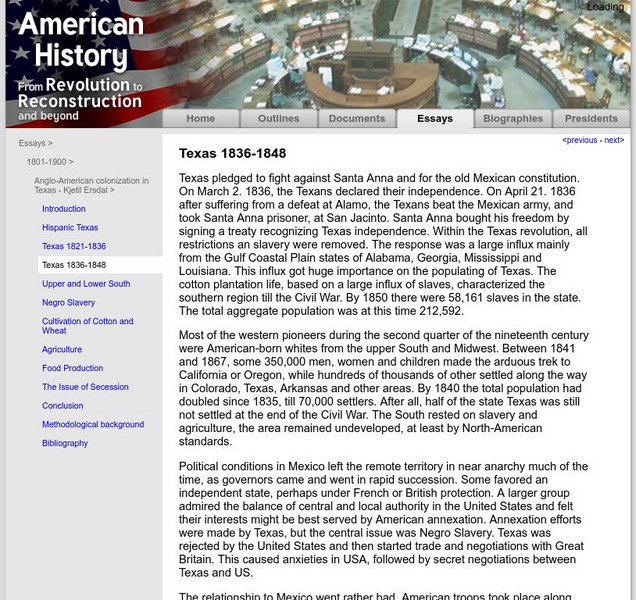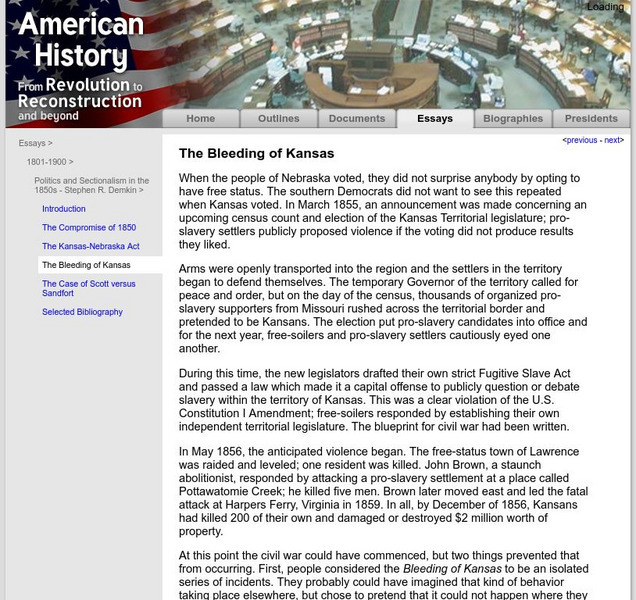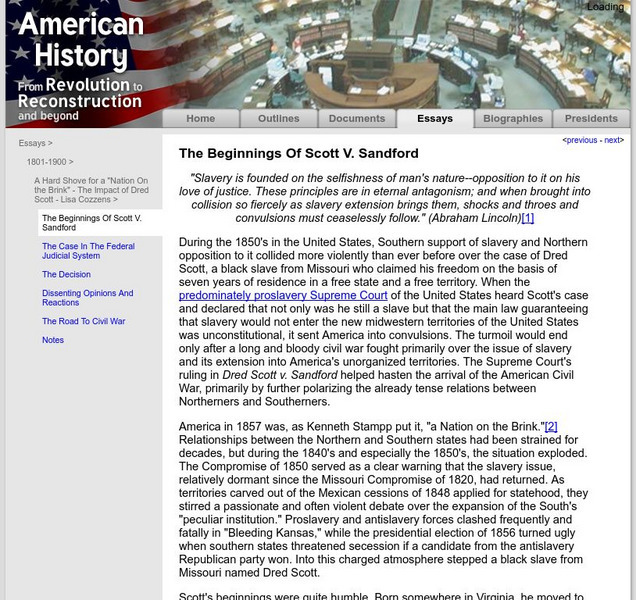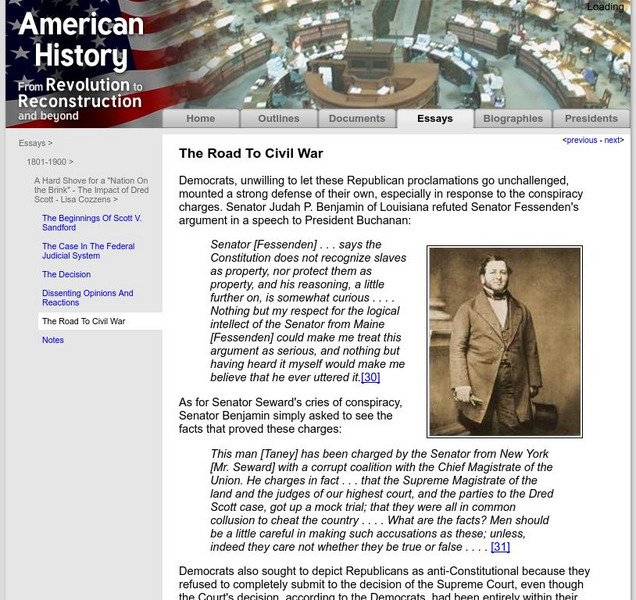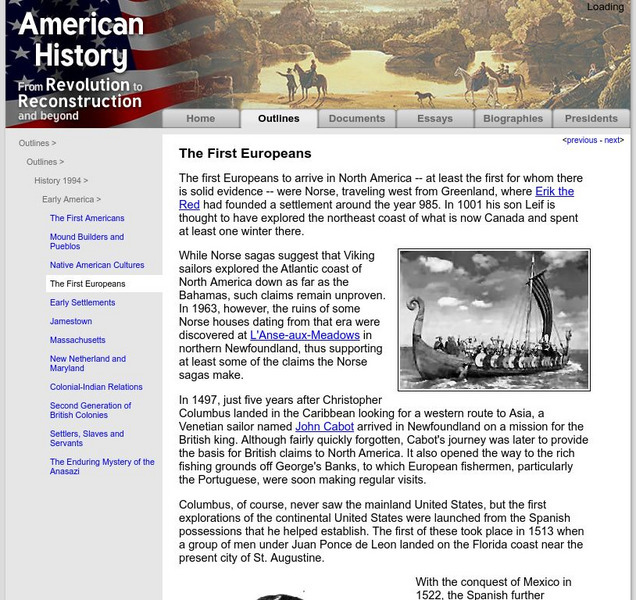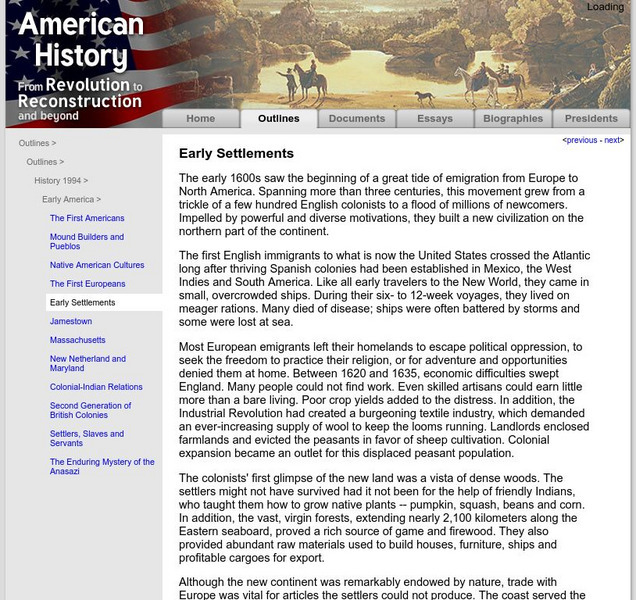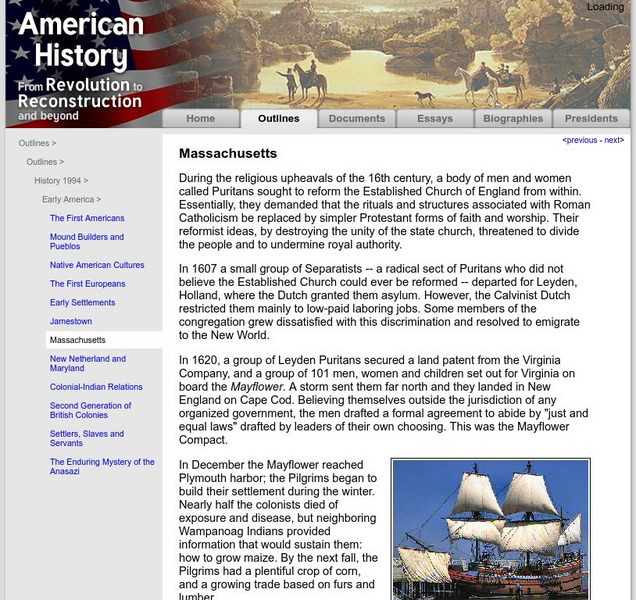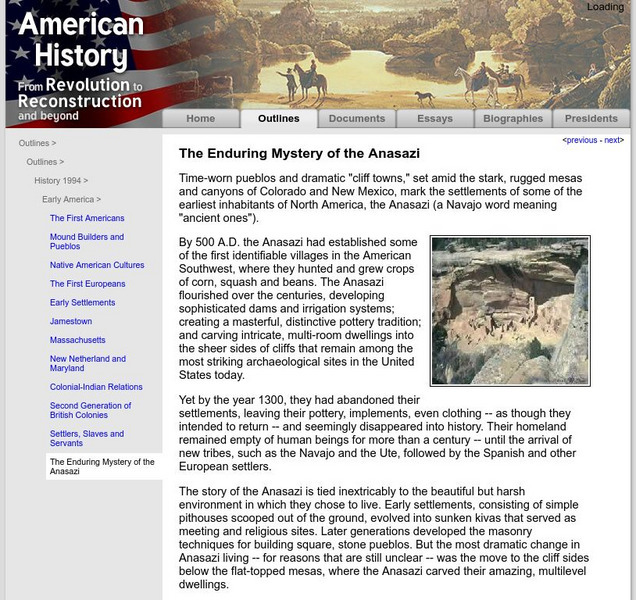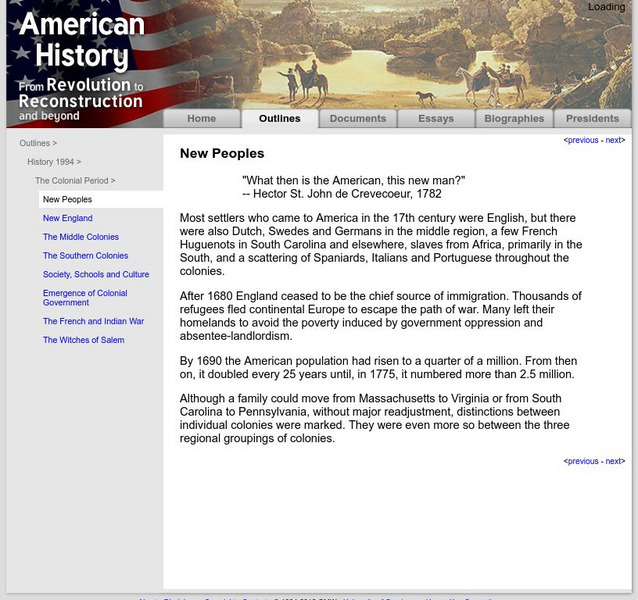Hi, what do you want to do?
University of Groningen
American History: Essays: Anglo Amer. Colonization in Texas: Texas 1821 1836
Describes the clash of cultures among the different groups living in Texas between 1821 and 1836, in the lead-up to Texas independence.
University of Groningen
American History: Essays: Anglo Amer. Colonization in Texas: Texas 1836 1848
A brief look at the declaration of independence from Mexico by Texas in 1836, the removal of restrictions on slavery, and how this dramatically increased the population and led to a much greater reliance on the cotton industry in the...
University of Groningen
American History: Essays: Politics and Sectionalism: Compromise of 1850
Summarizes the events that took place to develop the Compromise of 1850.
University of Groningen
American History: Essays: Politics and Sectionalism: Kansas Nebraska Act
Discusses what led up to the Kansas-Nebraska Act of 1854, and the role Illinois Senator Stephen Douglas played in developing it.
University of Groningen
American History: Essays: Politics and Sectionalism: The Bleeding of Kansas
Discusses the tension in Kansas over the issue of slavery after Nebraska voted to be a free state.
University of Groningen
American History: Essays: Politics and Sectionalism: Scott Versus Sandford
Outlines what happened with the Dred Scott case as it was passed on from the local state court all the way up to the federal Supreme Court, with a final decision being reached in 1857.
University of Groningen
American History: Essays: Impact of Dred Scott: Beginning Scott v Sandford
Explains the background for the Dred Scott case and its journey through the court system, finally reaching the US Supreme Court.
University of Groningen
American History: Essays: Impact of Dred Scott: In Federal Judicial System
Describes how the Dred Scott became increasingly significant politically as it progressed through the court system, finally reaching the US Supreme Court.
University of Groningen
American History: Essays: Impact of Dred Scott: The Decision
Describes the difficult process the US Supreme Court judges went through in preparing their final decision in the Dred Scott case.
University of Groningen
American History: Essays: Dred Scott: Dissenting Opinions and Reactions
Describes the fallout after the Dred Scott decision by the US Supreme Court, where two judges released their dissenting opinions, newspaper articles both reviled and supported the decision, and public debate raged.
University of Groningen
American History: Essays: Impact of Dred Scott: The Road to Civil War
After the Dred Scott decision by the US Supreme Court, the friction between the North and South over slavery escalated, and the North began to fear that they might not be able to prevent slavery from spreading into their states. The Dred...
University of Groningen
American History: Essays: Manifest Destiny: Philosophy That Created a Nation
A discussion of how Manifest Destiny became a philosophy that justified and fueled Americans' ideas about expansion and annexation of new territories.
University of Groningen
American History: Essays: Manifest Destiny: Components of Manifest Destiny
A discussion of the ideas that fueled Americans' belief in Manifest Destiny, including religious conviction and a sense of mission that they needed to dominate the land from coast to coast. This led to the drive to displace Native...
University of Groningen
American History: Essays: Manifest Destiny: Many Shades of Manifest Destiny
A discussion of the other guises of Manifest Destiny, including imperialism, yellow journalism, the idea of the white man's burden, the Monroe Doctrine, and the Roosevelt Corollary.
University of Groningen
American History: Essays: The Black Lost Cause: Examples of Colored Service
African American slaves are known to have fought for the Confederacy during the Civil War, which many people may not realize. Why they would fight on the side of slavery, and the evidence that they did, are discussed in this section of...
University of Groningen
American History: Essays: The Black Lost Cause:critical Analysis of Examples
Discusses the research by historians to try to determine the extent to which African Americans fought for the Confederate cause. They examined letters, service records, anecdotes, photographs, pension records, etc. but were unable to say...
University of Groningen
American History: Essays: The Black Lost Cause: Elaboration
Explains how the idea of African Americans fighting in large numbers for the Confederate cause is a wrong one that has been propagated by untrained historians who used unreliable sources.
University of Groningen
American History: Outlines: The First Europeans
The first Europeans to arrive in North America -- at least the first for whom there is solid evidence -- were Norse, traveling west from Greenland, where Erik the Red had founded a settlement around the year 985. In 1001 his son Leif is...
University of Groningen
American History: Outlines: Early Settlements
The early 1600s saw the beginning of a great tide of emigration from Europe to North America. Spanning more than three centuries, this movement grew from a trickle of a few hundred English colonists to a flood of millions of newcomers....
University of Groningen
American History: Outlines: Massachusetts
During the religious upheavals of the 16th century, a body of men and women called Puritans sought to reform the Established Church of England from within. Essentially, they demanded that the rituals and structures associated with Roman...
University of Groningen
American History: Outlines: Colonial Indian Relations
By 1640 the British had solid colonies established along the New England coast and the Chesapeake Bay. In between were the Dutch and the tiny Swedish community. To the west were the original Americans, the Indians.
University of Groningen
American History: Outlines: Second Generation of British Colonies
The religious and civil conflict in England in the mid-17th century limited immigration, as well as the attention the mother country paid the fledgling American colonies. In part to provide for the defense measures England was...
University of Groningen
American History: Outlines: The Enduring Mystery of the Anasazi
Time-worn pueblos and dramatic "cliff towns," set amid the stark, rugged mesas and canyons of Colorado and New Mexico, mark the settlements of some of the earliest inhabitants of North America, the Anasazi (a Navajo word meaning "ancient...
University of Groningen
American History: Outlines: New Peoples
Most settlers who came to America in the 17th century were English, but there were also Dutch, Swedes and Germans in the middle region, a few French Huguenots in South Carolina and elsewhere, slaves from Africa, primarily in the South,...






